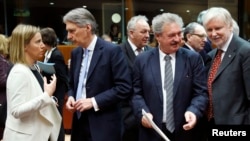The European Union on Monday threw its weight behind peace talks in Libya as they enter a decisive phase but backed away from planning a security mission until stability returns to the conflict-torn country.
“We do not see alternatives to the political dialogue,” EU foreign policy chief Federica Mogherini said, after chairing talks between the bloc's foreign ministers in Brussels. “What we are preparing for is European Union measures to support the outcome of the political process.”
Central authority has broken down in Libya amid fights between militias, some linked to the extremist Islamic State group, and rival parliaments claim political legitimacy.
U.N.-backed peace talks are due to resume in Morocco on Thursday, and the EU wants to see how those negotiations play out.
“We've got to establish a cease-fire and get some unity ... before we can talk about how we might support a peace” settlement, British Foreign Secretary Philip Hammond told reporters.
“We should focus on political integration right now” before thinking about security options, said Belgian Foreign Minister Didier Reynders. “It's too early to talk about it.”
The EU is concerned that the conflict in Libya could spread to the wider region. Member states are also fear that extremist fighters could reach Europe with the thousands of migrants that use Libya as a jumping off point to cross the Mediterranean.
But the EU would not act without an official request from the U.N. or an invitation from Libya itself.
“It doesn't seem that the situation would be appropriate for a U.N. peacekeeping intervention. So we will have to see ... what other potential role would be in place for Europe,” said Ireland's European affairs minister, Dara Murphy.
Italy is on the frontline of the immigration wave and has been trying to spur the EU into action, but even Rome wants to focus on the political track for now.
Italian Foreign Minister Paolo Gentiloni said that Italy could eventually help to train Libyan police, but he insisted that political progress must be made first.
The ministers also said in a statement that the EU would help build up the anti-terror and border security capacities of Libya's neighbors, as well as disrupt the flow of weapons and foreign fighters.
Mogherini has said that the EU could launch a military and border operation in Libya, followed by a rule of law mission to help build up the police and justice system. She said she would “bring concrete proposals” on possible measures to the next EU foreign affairs meeting on April 20.









